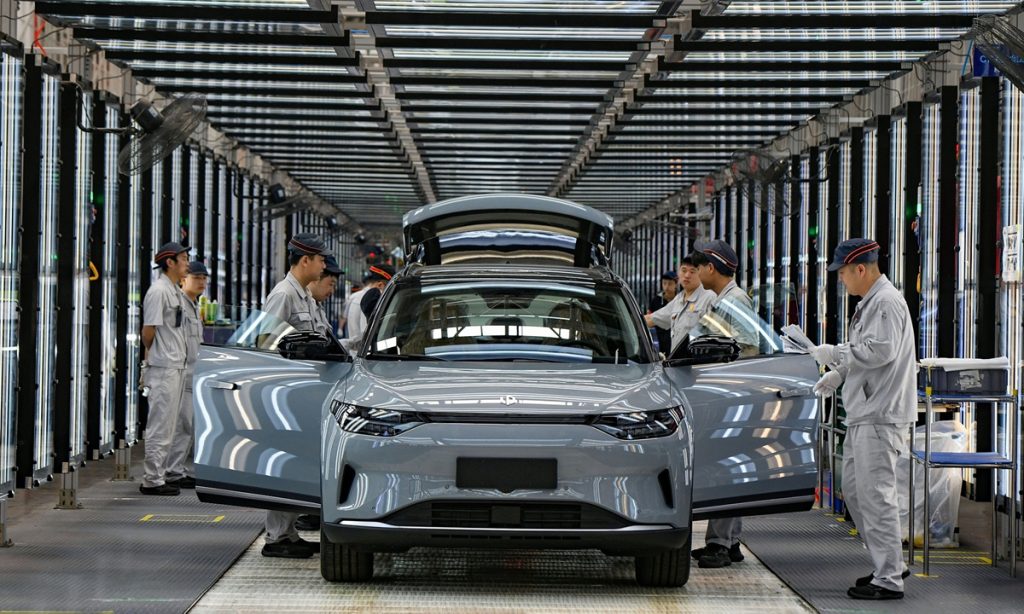MOFCOM asks EU to make decisions based on facts, rules regarding anti-subsidy investigation of Chinese EVs

China's Ministry of Commerce (MOFCOM) on Thursday urged the EU to make decisions based on facts and rules regarding its anti-subsidy investigation of Chinese electric vehicles (EVs).
The remarks come in response to foreign media reports that the EU is conducting an anti-subsidy investigation on Chinese EVs because Chinese car companies have received subsidies from the Chinese government, which has resulted in unfair price competition for European car companies.
He Yongqian, the newly appointed MOFCOM spokesperson, emphasized the importance of the EU recognizing mutually agreed-upon facts and rules, rather than making unilateral assertions.
Europe should acknowledge the facts that China's competitive advantages in EVs does not stem from subsidies, and that cooperation between China and the EU benefits both parties, while European automakers are against trade protectionism too, the spokesperson said.
Currently, China and the EU are engaged in negotiations regarding the anti-subsidy investigations, and facts and rules should be the "two main pillars of the negotiations," He noted.
It shows that the basis for the anti-subsidy investigation proposed by the European side is not sufficient, and they are actually exaggerating or misleading parties in certain aspects. To resolve the dispute, starting from an incorrect point will only lead the situation further astray, Cui Hongjian, a professor from Beijing Foreign Studies University's Academy of Regional and Global Governance, told the Global Times on Thursday.
At the same time, the European side should consider the negotiations in the context of overall EU-China relations, as cooperation in the EV sector and other green industries can reflect common interests between China and the EU, Cui said.
After the European Commission in June revealed a list of protectionist duties it would levy on EV imports from China, it has sparked opposition and concerns from governments and businesses across the continent.
US EV giant Tesla on Wednesday raised prices of its Model 3 cars in European countries including Germany, the Netherlands and Spain by about 1,500 euros ($1,622) after the EU imposed tariffs on EVs made in China, Reuters reported on Thursday.
Hungary on Wednesday voiced its opposition against the EU's decision to impose extra tariffs on China-made EVs, as European officials and businesspeople continued to express their dissatisfaction of the EU actions.
Major German carmakers including BMW, Mercedes-Benz and Volkswagen also criticized the planned tariff and voiced their support for fair competition and free world trade.
China's success in the EV sector is primarily driven by technological innovation, the country's strong supply chain, and the highly competitive domestic market, rather than relying on subsidies. The EU's assertion that China's affordable EVs are heavily subsidized and disrupt the market is untrue, experts said.
The decision to impose additional tariff on Chinese EVs is a protectionist move to protect its traditional industry and is politically motivated, Zhang Xiang, secretary general of the International Intelligent Vehicle Engineering Association, told the Global Times on Thursday.
In reality, it is the EU's protectionist measures targeting Chinese companies that are causing market disruption and creating barriers for Chinese companies, experts said.
On Wednesday, MOFCOM launched a trade and investment barrier investigation into the relevant practices under EU's foreign subsidy investigations in response to requests from Chinese industry groups.
The Chinese ministry also said on Thursday that its anti-dumping investigation linked to brandy imported from the EU was already under way. A hearing will be held on July 18 to allow stakeholders to present their opinions and provide evidence.
"Europe should meet China in the half way and jointly manage differences, rather than provoke and escalate disputes. Both sides should strive to avoid the lose-lose situation and seek practical solutions," Cui said.